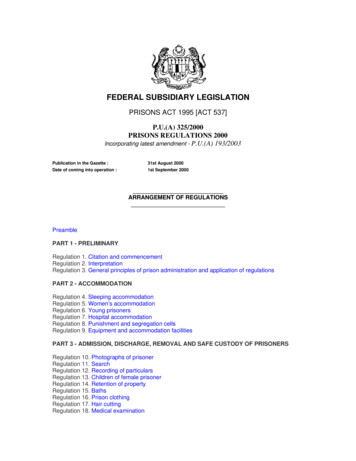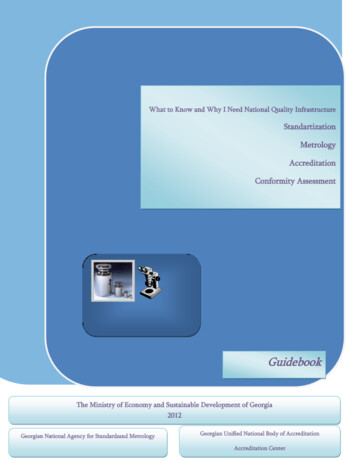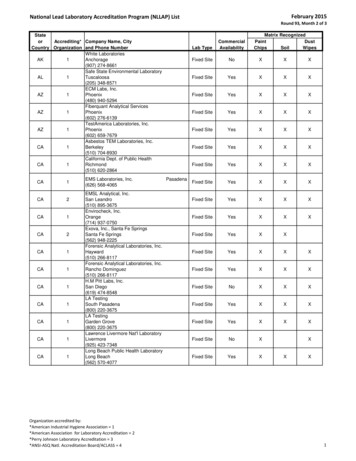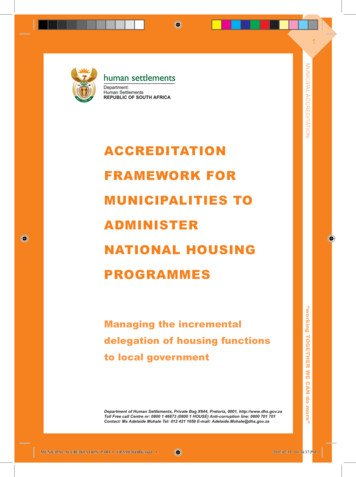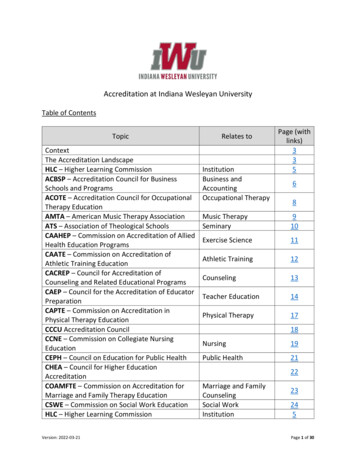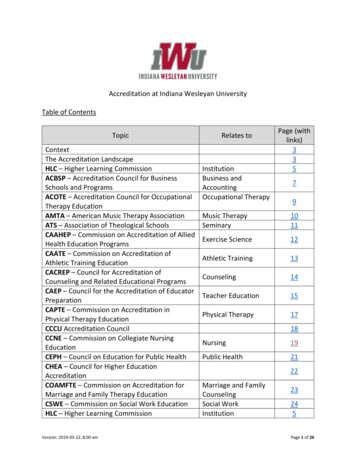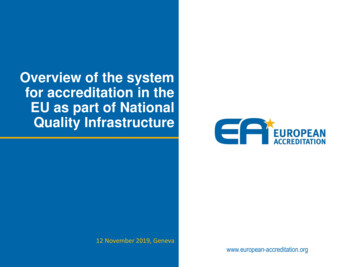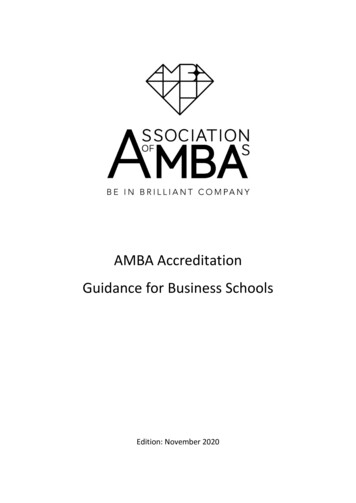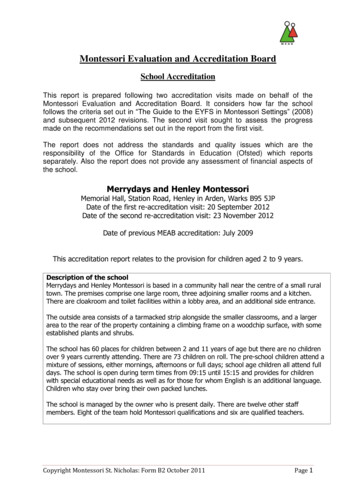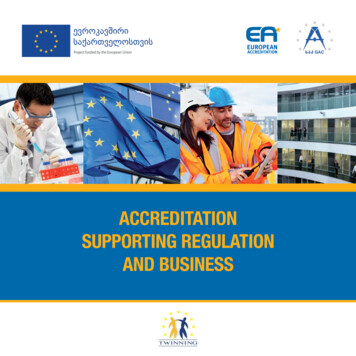
Transcription
ACCREDITATIONSUPPORTING REGULATIONAND BUSINESS
This brochure was realised in the frame of the European Twinning project (GE 16 ENI EC 07 18)“Strengthening Georgian Accreditation System with the Focus on EU Technical Regulations” and wasproduced with the financial support of the European Union. Its contents are the sole responsibilityof the GAC and do not necessarily reflect the views of the European Union. The English originalversion of this brochure was developed by EA - European co-operation for Accreditation.
GAC - THE GEORGIAN ACCREDITATION CENTER5TOWARDS APPROXIMATION WITH EU7ACCREDITATION BODIES' NETWORK9ACCREDITATION11ASSURANCE OF COMPETENCE15PUBLIC AND PRIVATE BENEFITS19CONFORMITY ASSESSMENT23
GAC for qualityin Georgia
GAC - THE GEORGIAN ACCREDITATION CENTERA recognized role for supporting Government and businessThe Unified National Body of Accreditation - Accreditation Center (GAC) is the sole nationalaccreditation body of the Georgia established by the government to perform accreditation activityof conformity assessment bodies, such as testing, medical and calibration laboratories andcertification and inspection bodies.Accreditation of conformity assessment bodies is performed in the voluntary areas as well as in theregulated areas.GAC was founded in November, 2005 and operates as a Legal Entity of Public Law under the Ministryof Economy and Sustainable Development of Georgia.The institutional commitment of GAC is to attest that accredited bodies offering testing, examination,calibration, certification and inspection, have the technical competence and impartiality to check theconformity of products and services with the relevant national and international standards.In 2021, there were 262 accredited conformity assessment bodies, divided into 119 testing laboratories,5 medical laboratories, 3 calibration laboratories, 7 persons certification bodies, 5 product certificationbodies and 123 inspection bodies.GAC structure consists of the: Accreditation Committee Division for Accreditation General Director Administration Service Deputy General Director/Quality Manager5
European Unionalignment
TOWARDS APPROXIMATION WITH EUA national accreditation system in line with the EU requirementsGAC performs its activities in accordance with relevant legislation, international standardsand EA, IAF and ILAC requirements.The main normative act is the “Law of Georgia - Code on Safety and Free Movement of Goods”adopted in 2012, which incorporated requirements of the European Regulation (EC) 765/2008.Since 2008, the Regulation establishes the legal framework for accreditation in Europe. It gives aharmonized, rigorous approach to accreditation, so that ultimately one accreditation certificate orreport will be enough to demonstrate the technical competence of an accredited body.The main principles of accreditation in the Regulation - which complement ISO/IEC 17011 and theother international standards for conformity assessment bodies - are: One accreditation body per Member State Accreditation is operated as a public authority activity No competition between national accreditation bodies,and between them and conformity assessment bodies Not-for-profit activity Stakeholder representation7
Internationalrecognition
ACCREDITATION BODIES' NETWORKEA - European co-operation for Accreditation, IAF and ILACGAC is a B category Member of EA (European co-operation for Accreditation), signatory ofEA BLA (Bilateral Agreement), an Associate Member of ILAC (International LaboratoryAccreditation Cooperation) and signatory of the memorandum of Membership (MoM).EA (European co-operation for Accreditation) at European level, and ILAC (International LaboratoryAccreditation Cooperation) and IAF (International Accreditation Forum), at global level, represent thenational accreditation bodies from the main economies in the ilac.orgGAC as a B category member of the EA is recognized in the following areas: ISO/IEC 17025 - Calibration ISO/IEC 17025 - Testing ISO 15189 - Medical laboratories ISO/IEC 17020 - Inspection bodies ISO/IEC 17065 - Product certification ISO/IEC 17024 - Persons certification9
What isaccreditation
ACCREDITATIONA service for the trust and safetyAccreditation provides the attestation that accredited bodies offering testing, medical,calibration, certification and inspection services have the technical competence and impartialityto check the conformity of products and services with the relevant national and internationalstandards.Acting as authoritative and impartial entities, National Accreditation Bodies evaluate competence oflaboratories and bodies performing conformity assessment activities and guarantee the credibilityand reliability of their certificates and reports.Likewise in Europe, accreditation is performed in Georgia by national accreditation body - GAC, thatis established by government as required by Regulation (EC) 765/2008.In the regulated/mandatory area, the legislation requires accreditation for those bodies that qualifycertain categories of products and services (e.g. products such as toys, lifts, food products withprotected or guaranteed origin, etc.) which can be put onto the market only after undergoingconformity assessment against the applicable standards.In the voluntary area, where there is no specific legislation, companies seek accreditation to providethe market with an impartial attestation of their competence in guaranteeing products' and services'quality, safety, security, etc.11
AccreditationAccreditation is the formal recognition of the technical and organisational competence of a conformityassessment body to carry out specific services in accordance with the standards (ISO, IEC, etc.) ortechnical regulations as described in its scope of accreditation.TESTINGLABORATORIESISO/IEC C 17025ISO/IEC ONBODIESISO/IEC 17011ISO/IEC 17065ISO/IEC IEC 17024ISO/IEC 17021-1
Better regulation is based on a competent, impartial and effective system where governments,businesses and consumers have a role in maintaining confidence.REGULATORSrely onNATIONAL ACCREDITATION BODIESwhich verify the competence t SystemsPersonsCalibrationLaboratorieswhich offer conformity assessment servicesto standards/regulatory requirements/scheme criteriaTestingInterlaboratoryComparisons andProficiency-TestingProgrammesInspection ofProducts, Processes,Services andInstallation or theirdesignCertification ofProducts, Systems,Persons, Processesor ServicesCalibrationfor the benefit ofGovernmentsBusinessesConsumerson the market ofProductsServices13
How iscompetenceassured?
ASSURANCE OF COMPETENCEProviding confidence in reports and certificates resultsAccreditation is based on demonstrating compliance with specified requirements forcompetence, independence and impartiality.COMPETENCEThe experience and technical skills of the staff in the accredited or applicant body are verified byqualified assessors with relevant expertise and specialised knowledge.INDEPENDENCEAccredited bodies that grant certification shall show independence from the organisation to whichtheir services are provided.IMPARTIALITYAccredited bodies shall show absence or proper management of conflicts of interest with the client towhom they provide services.15
How doesaccreditationprocess work?
The reliability of reports (of test and inspection) and certificates (of calibration and conformity,etc.) is the result of a rigorous and effective process of evaluation of competencies according tointernational requirements.INITIAL ASSESSMENTNational accreditation bodies’ assessors conduct a thorough evaluation of the applicant’s practices, staffand management system, thus verifying compliance with standards. Applicant bodies having successfullypassed assessment are accredited. They can use the accreditation mark for the accepted scopes.ACCREDITATION CYCLE COVERS 4 YEARSNational accreditation bodies carry out regular surveillance assessments to ensure that accreditedbodies maintain high standards of technical expertise. They can impose sanctions when accreditedbodies are not fulfilling all obligations and requirements, and then accreditation scopes can be reduced,suspended or even withdrawn.EXTENSION OF SCOPESDuring the cycle or at renewal, accreditation scopes can be extended to other services, in response tonew needs of accredited bodies' customers. Specific assessments are carried out, for instance to beable to perform tests according to a new legislation.RENEWAL OF ACCREDITATIONAt the end of the cycle, accreditation can be renewed after a complete assessment for a new cycle.17
What benefitsfor the publicand privatesectors?
PUBLIC AND PRIVATE BENEFITSAdvantages for regulators and governments become benefitsfor consumers and businessesDeveloped on the market to facilitate the movement of goods and services where demand for qualityand safety is growing, accreditation offers a harmonised, transparent and repeatable approach which: enables innovation reduces the need for governments to employ their own resources builds consumers’ and businesses’ confidence helps fulfil legal requirements at reasonable costs19
For regulators and governmentsTesting, inspection, calibration and certification can be used for better enforcement of the regulation.The services provided by accredited bodies, either used directly by regulators and governments or asa tool reference in rules and regulations, demonstrate effectiveness in: supporting implementation of the national legislation, providing a “stamp of approval” to confirmcompliance with standards and widely accepted requirements qualifying suppliers of goods and services, especially on the procurement market enhancing trade and economic growth, providing governments with reliable data reducing bureaucracy by eliminating a number of administrative obligations limiting costs and resources, by reducing the need for regulators to employ their specializedassessment personnel and by avoiding duplication of audits simplifying the procurement process by ensuring confidence as a decision-making tool
For consumersCreating trustIncreasingly consumers rely on independent evidence, rather than simply believing in suppliers’ advertisements.Consumers’ confidence on the market is enhanced when they know that the products and services they chooseare regularly evaluated and checked by an independent and competent third party.Protecting, in the public interestAt the other end of the supply chain, consumers’ interest is protected by national accreditation bodiesacting as “checkers of checkers”.For businessesBoosting efficiencyAccurate calibration, measurement and testing, performed in accordance with best practice, help limiterrors and product failure, improve control of production costs and contribute to an innovativeenvironment. When they obtain certification of their management system, products or services by anaccredited body, companies enhance their performance by using a recognised tool for decision-making,risk management and supplier selection. Thus, they enjoy a competitive advantage in terms of reputationand credibility, both on the B2B and consumer markets.21
Reducing controlsAccredited certification conveys presumption of conformity with official standards and regulations.This means that businesses do not need to provide additional evidence, and their activities aresimplified subsequent to reduction or elimination of controls.Supporting exportThe international recognition of conformity assessment reports covered by accreditation boostsbusiness expansion on foreign markets without the need to carry out additional verifications.
THE ADDED VALUE OF ACCREDITATIONAccredited conformity assessment activitiesAccredited tests, inspections, calibrations and certifications result on a third party,independent and competent evaluation, providing objective results to support sound decisionsin regulation, public procurement or delivery of products and services onto the market.Accredited bodies performing such services assure that they meet all required standards, as well asregulatory requirements and sector criteria, in terms of: technical competence, professionalism and integrity risk management adequate human and equipment resources mechanism for measuring improvement of product and service quality complaint and appeal system capacity to compete on an international scaleWhen referring to accreditation, it is important to recognise or specify the appropriate requirementsfor the services or bodies providing them, according to the type of guarantees required.When selecting an accredited body, it is essential to identify the scope of activities for whichthe accredited body is granted accreditation; this is detailed on the accreditation certificate.23
Whatthe differentaccreditedservices?
TEST AND CALIBRATIONAccredited tests and calibrations guarantee accurate and reliable results for a defined set of tests,and ensure that calibrations are carried out in a reliable, competent, consistent and impartial mannerand to the correct degree of accuracy.Accreditation of a testing and a medical laboratory means: validity and appropriateness of test methods suitability and maintenance of test equipment proper sampling, handling and transportation of test items quality control and assurance of test dataAccreditation of a calibration laboratory means: metrological traceability of calibration results traceability of operations and recordings measurements are performed according to validated procedures reliability of standards and measurement instrumentsAccreditation to ISO/IEC 17025 also means that the laboratory meets the management systemprinciples of ISO 9001.25
PROFICIENCY TESTING PROVIDERS (PTP)Accredited proficiency testing (PT) provides reliable opportunity to undertake comparisons oflaboratories’ competence and to have an independent appraisal of laboratories’ data compared toreference values (or other performance criteria) or to the performance of similar laboratories.INSPECTIONAccreditation provides assurance of competence of inspectors, relevance of methods for conductinginspections and impartiality of results.Inspection can be used, in the voluntary and regulated areas, for the assessment of the conformity ofa product, project, service, process or installation with relevant requirements based on professionaljudgement.CERTIFICATION OF PERSONSThe accreditation of the bodies certifying persons is either voluntary or compulsory; it may be astatutory requirement for certain professional categories (i.e. non-destructive testing, welding,property, diagnostic surveys, etc.).The accredited certificate for persons refers to the qualification of the person that the body hasevaluated as competent to certify, with the correct reference to the normative document whichthe person's competence conforms to.
MANAGEMENT SYSTEM CERTIFICATIONManagement system (MS) certification guarantees that production processes of a product or serviceare under control and carried out in a systematic way, and that performance is constantly improvedand aims to meet clients’ requirements.Accredited MS certifications ensure impartiality in the assessment; auditors are knowledgeable aboutthe activity to be certified and have the relevant expertise.An organisation is certified only in conformity with the management system standard mentionedon the certificate covering the specified scope, which consists of the certification applicationfield and the detailed processes verified and certified by the competent body. Organisation sitescovered by certification are also listed on the management system certificate.CERTIFICATION OF PRODUCTS, PROCESSES OR SERVICESA product (i.e. a low energy bulb), a service (i.e. passenger transport) or a process (i.e. organicfarming, traceability of timber origins) can be subject to certification.Product certification aims to the statement by the producer that the product (or process or service) conformsto the relevant requirements. It is not the task of the certification body to declare the conformity of the product,but to attest the trueness of the conformity to the applicable requirements claimed by the producer.Accredited product certification gives evidence of the independence between the certification bodyand the manufacturer, and provides presumption of conformity with the applicable legal requirements.The accredited certificate for the product shall bear the detailed reference to the technicalstandard or technical specifications which the product is certified in conformity with.27
The Unified National Body of Accreditation - Georgian Accreditation Center - GACWebsite: www.gac.gov.geEmail: gac@gac.gov.ge Copyright EA 2022
Acting as authoritative and impartial entities, National Accreditation Bodies evaluate competence of laboratories and bodies performing conformity assessment activities and guarantee the credibility and reliability of their certificates and reports. Likewise in Europe, accreditation is performed in Georgia by national accreditation body - GAC, that
